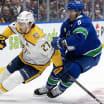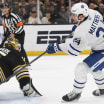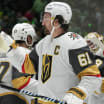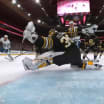TORONTO -- The six members of the Hockey Hall of Fame Class of 2020 were inducted Monday.
COVID-19 forced postponement of the induction ceremony last November, and the board of the Hockey Hall of Fame decided it would not select a new class until the 2020 class was inducted.
Here are some of the key moments from the induction speeches of Jarome Iginla, Marian Hossa, Kim St-Pierre, Ken Holland, Kevin Lowe and Doug Wilson, as well as from NHL Commissioner Gary Bettman's comments:
Highlights from Hockey Hall of Fame Class of 2020 speeches
Iginla, Lowe, St-Pierre, Holland, Hossa, Wilson inducted; Commissioner Bettman says ceremony shows 'returning to normalcy'
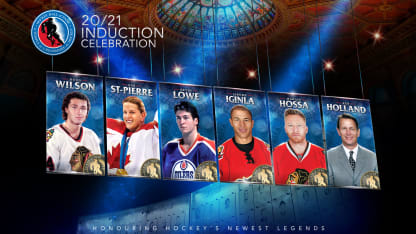
By
NHL.com @NHLdotcom
JAROME IGINLA: Beyond his dreams
Iginla said he wasn't too nervous before the Hockey Hall of Fame induction ceremony. Then he was suddenly starstruck after seeing players he would soon be joining in the Hall of Fame such as Mark Messier, Paul Coffey and Bryan Trottier.
"It was just so cool," Iginla said. "And I never, ever dreamed of it."
As Iginla noted, "I probably wasn't your typical hockey kid. My dad was emigrated to Canada from Nigeria. My mom came from Oregon."
But after a storied 20-season NHL career with the Calgary Flames, Pittsburgh Penguins, Boston Bruins, Colorado Avalanche and Los Angeles Kings, Iginla became the fourth Black person inducted into the Hall of Fame, following goalie Grant Fuhr, women's hockey pioneer Angela James and Willie O'Ree, the first Black player in the NHL and the NHL diversity ambassador, who was inducted in the Builders category in 2018.
Iginla recalled as a 7-year-old being asked by another youth player, "Why are you playing hockey?"
That's why Iginla thanked role models such as Fuhr, one of his idols when he was growing up in St. Albert, Alberta, and O'Ree, other former Black NHL players such as Claude Vilgrain and Tony McKegney, and Black hockey pioneer Herb Carnegie, who never got the chance to play in the NHL.
"I know it's thanks to guys like Grant and Willie who made me know my dream of playing in the NHL was attainable," Iginla said.
After thanking some of his former teammates such as Craig Conroy and Alex Tanguay, and former coaches such as Darryl Sutter, Mike Keenan and Claude Julien, Iginla expressed his gratitude to Hockey Canada for selecting him to represent his country on the biggest stages, including the 2004 World Cup of Hockey, 2002 Salt Lake Olympics, the 2006 Torino Olympics and the 2010 Vancouver Olympics.
Iginla called setting up Sidney Crosby's gold medal-winning overtime goal in the 2010 Olympics "one of my all-time favorite memories and thrills in hockey."
Iginla concluded by thanking his wife, Kara, daughter, Jade, and sons Tij and Joe.
"To retire from what I believe is the greatest job in the world isn't easy," Iginla said. "But having you guys to spend time with, to be a family, to coach … I wouldn't trade it for anything." -- Tom Gulitti
Jarome Iginla Hockey Hall of Fame speech
MARIAN HOSSA: Thankful for his mom's hands
If there is one thing that is more important to Marian Hossa than hockey, it is family. He credited his father, Frantisek, who played professionally in Europe, with instilling in him his love for the game. But it was not his father, who was a defensive defenseman, that he credited with the hands that helped him score 525 NHL goals.
"My brother, Marcel, and I will always be grateful for your guidance and support, Dad," Hossa said. "But we are thankful, thank god, for our mom's hands. It's not that we don't love you, Dad, we know it's just true based on the fact you never score more than a few goals a year."
Hossa grew up in Czechoslovakia, so he said the thought of the NHL seemed like worlds away. But when he got his first VHS tape with footage of Wayne Gretzky, he said it mesmerized him and inspired him to try the "impossible things that Wayne made look so easy."
Hossa said he and Marcel would wake up in the middle of the night to watch the Stanley Cup Final in the 1980s when Gretzky's Edmonton Oilers were winning championships, and in the early '90s when Mario Lemieux and Jaromir Jagr helped the Pittsburgh Penguins win the Cup twice.
"In Mario, I found another role model, and in Jaromir, I realized a Czechoslovak kid like me could excel in the greatest League in the world and I became determined to do the same," Hossa said.
Hossa paid tribute to his mother, Maria, who he said would always be there to pick up the slack when his dad was away during his own career, taking him and his brother to practices despite catching a bus to work each day at 5:45 a.m.
Hossa said he is grateful to play a more active role with his own family since retiring from the NHL.
"Not even scoring an overtime goal can compare to my little pumpkin Zoja running to greet me when I get back home, it makes my heart melt," Hossa said. -- Dave McCarthy
Marian Hossa Hockey Hall of Fame speech
KIM ST-PIERRE: Another barrier broken
St-Pierre lifted countless hockey fans out of their seats to celebrate her greatness as a three-time Olympic gold medalist and five-time world-champion goalie. On Monday, she earned another standing ovation, this one for her inspirational words in support of women in sport, women's hockey, her wish for a professional women's league and the importance of inclusion in hockey.
"I'd like to express admiration for all the women in the sports world that are breaking barriers in so many different roles," said St-Pierre, the eighth woman elected to the Hall of Fame, the first female goalie. "Your determination and accomplishments give us the motivation to work harder and keep moving forward. So many people look up to you, and you are giving them the chance to aspire that one day, they can be in your shoes or pave their own way. We have the power to achieve anything.
"But now it is our responsibility to make sure that women's hockey and girls hockey will continue to grow. We are all dreaming about a Women's Professional Hockey League and now it is time to make it a reality. Players have worked hard to reach their goals and they deserve to pursue their dreams. Never stop fighting for what you believe in. Your efforts will be rewarded."
In her 13-minute speech, St-Pierre gave thanks to her parents, in French and English, for letting their young daughter follow her dream to play hockey, at first in boys leagues when opportunities for girls in suburban Montreal didn't exist.
She recognized the love and support of teammates at every level, from minor hockey through McGill University and the Canada national team, and gave special thanks to Daniele Sauvageau, the former national team coach who believed in her and brought her to the world stage, where she sparkled.
When St-Pierre spoke of her two young sons, to laughter she gently reminded one who was fidgeting in his seat, "Liam, now it's time to listen, OK?"
Then she brought the audience to its feet with her closing words:
"And [thanks] to the Hockey Hall of Fame. Thank you for making tonight a special day in my life, and for teaching the young girls watching out there tonight that impossible is nothing and that they can be the change, that hockey is for everyone. Write your own story and achieve your own version of greatness." -- Dave Stubbs
Kim St-Pierre Hockey Hall of Fame speech
KEN HOLLAND: Support network, mentors
Holland's gratitude for those who helped him on his journey to induction into the Hall of Fame in the Builders category was the focus of his speech, from start to finish.
He began by thanking the man who succeeded him as Detroit Red Wings general manager, Steve Yzerman.
"What an honor for me to have Steve present me with the plaque," Holland said. "We were together for 26 years with the Detroit Red Wings. He's a good friend and he's had a huge impact on my career."
Holland was emotional about the life lessons from his parents, Rienie and Adeline.
"Our parents taught us the importance of work ethic, sacrifice, treating people with respect," he said. "That's how they lived their lives."
Holland's brother Dennis and sister Diane were present Monday, along with his wife, Cindy, and their children Brad, Julie, Rachel and Greg.
"My family are the most important people in my life," he said. "My wife, Cindy, is the rock and foundation of our family. We've been married 41 years. You've committed your life to me and our kids and our grandkids, and I'm incredibly blessed to have you at my side. Words cannot express how important you are to me. I love you."
The Oilers GM also thanked a long list of owners, colleagues, players, coaches, assistant GMs, scouts, support staff and NHL leaders and staff.
He had special praise for former Red Wings GM Jim Devellano and head scout Neil Smith, who helped him make the transition from player to executive, through the ranks as a scout and assistant GM before he became Red Wings GM in 1997.
"Neil taught me the business about evaluating players," Holland said. "I want Neil to know [he] had a huge impact on my career. Jimmy D was my mentor. Jimmy D believed in me, he guided me, and taught me the business of pro hockey. Thank you, Jimmy. I would not be up here tonight without you." -- Tim Campbell
Ken Holland Hockey Hall of Fame speech
GARY BETTMAN: 'Returning to normalcy'
"Merriam-Webster dictionary defines [normal] as conforming to a type, standard, or regular pattern; characterized by that which is considered usual, typical or routine," Commissioner Bettman said. "Normally, 'normalcy' might not sound too exciting. But after almost two years without it, returning to normalcy sounds and feels fantastic."
The Commissioner said the NHL was well down the road to normalcy by "beginning an NHL season in October; crossing the border between the [United States] and Canada; fans back in our arenas; and the Stanley Cup which will be hoisted in June.
"And the hockey world coming together, in Toronto, on a chilly November night, to honor that which is anything but normal -- the best who have ever played, coached or helped build the greatest game in the world. That we couldn't come together in this way a year ago left a colossal void in the hockey calendar. But there's the old saying, which is true, about good things come to those who wait. Because, tonight, we are honoring a remarkable class -- elected last year -- upon its overdue induction tonight into the Hockey Hall of Fame."
Commissioner Bettman said the celebration of the newest class of inductees was a time to reflect on the NHL's responsibility to the game and those who make it great.
"We are looked to as an example for society and communities -- even beyond hockey," he said. "And that begins with acknowledging when wrongs are committed and ensuring they are handled with empathy, respect and inclusion.
"It means, specifically: What happened to Kyle Beach 11 years ago was unacceptable. Kyle has our gratitude for coming forward. We mourn his pain. And, with him, we look to the future."
Beach on Oct. 27 came forward as the John Doe who claimed that while a forward prospect with the Blackhawks in 2010, he was sexually assaulted by then-video coach Brad Aldrich.
"Our 'normal' for Kyle and anyone else must always be vigilance to make sure that everyone understands what is and is not acceptable, so that our game is always welcoming and inclusive to all," Commissioner Bettman said. "Our normal must be to learn from the past and do better in the future.
"We know that the true essence of our great game is, and should always be, extraordinary. Extraordinary as reflected in the lives of the people in this great hall and in particular, the careers of the six people we honor tonight, as well as in the countless people who are part of our game and stand for the values that we believe are our 'normal.'
"This Hall, and our game, are better because of the six of you who are being inducted tonight. Congratulations to all of you on behalf of the National Hockey League." -- Tim Campbell
Gary Bettman speaks at Hockey Hall of Fame ceremony
KEVIN LOWE: All in the Oilers family
Lowe's first words weren't to thank anyone or to say how humbled he was at being inducted into the Hockey Hall of Fame. That would come later.
No, his initial comments had to do with his raspy voice, which he claimed did not come from too many late nights during Hall of Fame weekend.
"I know most of you think about the Oilers of the '80s and how we were out partying a lot," he said. "Although we had and are having some good times, my poor voice is due to a cold. It has nothing to do with the festivities."
The crowd broke into laugher, no one chuckling more than the four former Oilers teammates and Hall of Famers who had come to support their friend.
Mark Messier, Glenn Anderson, Paul Coffey and Jari Kurri, all part of the Oilers run of four Stanley Cup championships in five years (1984, 1985, 1987, 1988), were on hand for Lowe's special night. Messier presented Lowe with his Hall of Fame plaque. Lowe mentioned Kurri attending his number-retirement ceremony in Edmonton on Nov. 5, flying home to Finland and then returning to Canada for Lowe's induction.
Lowe admitted those four, along with former teammates and Hall of Famers Wayne Gretzky and Grant Fuhr, were flashier players than he was. He scored 431 points (84 goals, 347 assists) in 1,254 NHL games, numbers he admitted on their own weren't Hall of Fame worthy.
It was the acknowledgement of the intangibles he brought to the table, he said, that allowed him to enter the Hall.
"My Hall induction doesn't happen because of my statistical merit," he said. "I want to thank the Hockey Hall of Fame selection committee for recognizing a player like me.
"Jacques Lemaire (Class of 1994) said in the game of hockey, it's important to know that there are two nets and that both are equally important. One net, however, is a little tougher to quantify."
Lowe won the Stanley Cup a fifth time with the Oilers (1990) and went on to help the New York Rangers end a 54-year Cup drought four years later. He mentioned that he was one of seven former Oilers on that Rangers team.
He then playfully suggested that they might be able to help the local team, the Toronto Maple Leafs, end their 54-year drought as well.
"Maybe the Leafs should get us," he said before breaking into a wide grin. "Hey, I couldn't help myself." -- Mike Zeisberger
Kevin Lowe Hockey Hall of Fame speech
DOUG WILSON: 'Do what you love'
Wilson began his speech by noting how fitting it was for him to be presented with his Hall of Fame plaque by Brian Kilrea, a 2003 Hockey Hall of Fame inductee as a Builder who coached him for three seasons with Ottawa in the Ontario Hockey League.
"He was more than a coach," Wilson said. "He was a teacher of life."
Wilson grew up idolizing Bobby Orr and wanted to be an offensive defenseman like him but said there were many that inspired him, none more than his parents.
"My mom and dad encouraged me to play all sports," Wilson said. "Find the one that you love. Do what you love."
Wilson mentioned his father, Douglas, among those who impacted his life and have died, along with his first NHL roommate with the Chicago Blackhawks, Stan Mikita, who died in 2018, former Blackhawks defenseman Keith Magnuson, who died in 2003, and former Blackhawks goalie Tony Esposito, who died from pancreatic cancer Aug. 10.
"His love of life, his work ethic, his commitment, we miss them all," Wilson said of Esposito.
Wilson spoke of the honor of playing for the Blackhawks, who selected him with the No. 6 pick in the 1977 NHL Draft, and in front of their fans at Chicago Stadium for 14 seasons.
Although there were "too many to name," Wilson listed some of his former teammates such as Denis Savard and Steve Larmer, and longtime Blackhawks television play-by-play announcer Pat Foley and journalist Bob Verdi.
Wilson then turned to "the beginning of another journey," joining the San Jose Sharks in 1991 and playing for two seasons with the expansion team before retiring in 1993.
"To be on the ground floor of something brand new was an exciting challenge for me," said Wilson, who has been Sharks general manager since 2003.
Wilson concluded by talking with pride about his four children and six grandchildren, and his wife, Kathy, who he called "the heartbeat of our family."
"The grandkids are in awe. They look up to you," Wilson said. "You're a role model for all of us. If anybody truly deserves to be a Hall of Famer, I think it's you, Kath." -- Tom Gulitti
Doug Wilson Hockey Hall of Fame speech


